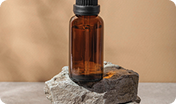Healing and claims
-

Pain relief & more
We are often asked to certify products with functions that are beyond the scope of cosmetics, such as joint rubs, salves, headache balms, healing salves for aiding recovery after injury, disease, or recent tattoos.
Products marketed to treat, relieve, or cure medical conditions like eczema and psoriasis or those claiming other benefits such as oils marketed for hair growth. These functions are not considered cosmetic.
According to UK and EU regulations, cosmetic functions include moisturising, softening, protecting, cleansing, fragrancing, and improving the appearance of skin and hair.
We aim to protect our clients by advising that these types of products may be classed as medicines and that any therapeutic claim may result in the product being classed as a medicine and subject to regulation and intervention from the appropriate agencies.
For more information on making and selling these categories of product, please contact the MHRA: https://www.gov.uk/guidance/contact-mhra
-

Insect repellants
Insect repellents for humans are not covered by UK or EU cosmetic regulations.
Cosmetic products are defined by their functions, such as cleansing, perfuming, changing appearance, correcting body odours, protecting, and keeping the skin or hair in good condition.
Insect repellents, however, are intended to prevent insect bites, which is considered a biocidal function rather than a cosmetic one.
In the UK and EU, insect repellents fall under the Biocidal Products Regulation (BPR). This regulation governs the market placement and use of biocidal products, ensuring they are safe for humans, animals, and the environment.
The BPR requires that insect repellents undergo a rigorous approval process, including safety and efficacy assessments.
For further details on the relevant regulations and compliance requirements for insect repellents, you can refer to the Health and Safety Executive (HSE) in the UK or the European Chemicals Agency (ECHA) in the EU.








